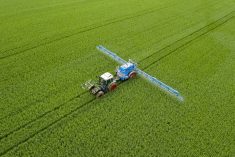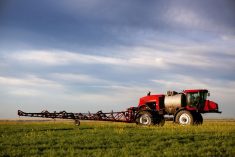Sourcing organic alfalfa seed has become more complicated since the commercial release of genetically modified alfalfa in the U.S., the executive director of the Canadian Organic Trade Association says.
Although it is not yet grown commercially in Canada, the herbicide-tolerant forage crop was given a green light by the Canadian Food Inspection Agency in 2005 and may already be present in trace amounts in the Canadian market, Matthew Holmes told a recent international trade workshop hosted by the Manitoba Organic Alliance.
“It could also be in our common seed right now,” he said. “It’s legal in Canada, technically speaking. It could be registered any day and be out there in the marketplace.”
Read Also

Manitoba canola industry has new frontiers
Canola oil is still the main priority for the sector, but canola meal is increasingly the subject of research looking for new markets and uses for the oilseed’s byproduct.
Because rules governing “adventitious presence” don’t require shipments containing tiny amounts to be shipped back, organic growers should use caution when buying alfalfa seed for use in their crop rotations, and only source registered varieties or common seed from trusted, reliable sources, said Holmes.
Donna Youngdahl, an organic specialist with the Canadian Wheat Board who sits on the Organic Value Chain Round Table, said a national strategy is needed to help the organic sector survive as use of GMO crops proliferates.
A study commissioned three years ago on the potential impact of GM contamination on the organic sector is currently under review by stakeholders.
The 70-page draft report lists 10 recommendations, ranging from a mechanism to share responsibility for losses due to contamination, the setting up of GMO-free zones, contamination thresholds, a liability scheme, and systematic testing for organic crops.
Other possible solutions listed in the document include compulsory best practices rules for both organic and GM growers, large buffer zones and testing protocols for organic seed growers, and a review of GM food labelling regulations.
“There is also a recommendation that the federal government should consider the economic impact, not just the environmental and health impact when deciding to allow commercialization of GM varieties,” said Youngdahl.
Holmes said that the growing number of GM crops moving from labs to fields appears to have sparked a public backlash.
The U.S. Food and Drug Administration has received almost a million letters calling for mandatory labelling of GM products, making the target of the “Just Label It” campaign the “single largest public response to an issue” in the country’s history.
“This is an issue that is not going away,” said Holmes.
Youngdahl said that 55 members of the U.S. Congress have thrown their weight behind the campaign. Also, a ballot initiative underway in California is seeking to make GMO food labels mandatory in the state.
“This is a new wave of action and it’s quite exciting to see a build-up of energy on this topic there,” she said.
But north of the border, Ottawa is looking at allowing low-level presence (LLP) — or one in 10,000 seeds — of non-approved GM crops in shipments to Canada.
The move comes in the wake of the Triffid flax debacle, which led to Europe slamming the door on imports from Canada.
“The thinking is that if they had LLP on imports, then they could shame other countries into having the same policy,” said Holmes, adding that it seems to be a “major” push on the part of the federal government.
A major setback for anti-GM activists came earlier this month when a U.S. district judge dismissed a lawsuit brought by the Public Patent Foundation and 83 plaintiffs including 36 farm organizations that targeted Monsanto’s record of suing farmers for patent infringement.
The group is drumming up support for a “risky” appeal, but if that bid loses, Monsanto could sue the plaintiffs to recover its legal costs.
“So far, MOA hasn’t gone out on a limb on that one,” said Youngdahl. “I don’t know anyone who wants to lose their farm fighting with Monsanto on this issue.”
Paul Gregory, owner of Interlake Forage Seeds in Fisher Branch, said that the risk of unleashing a herbicide-tolerant perennial that cross-pollinates with common alfalfa varieties dwarfs the potential benefits.
“It’s a Pandora’s box,” he said.
His contacts south of the border say that uptake of Roundup Ready Alfalfa has been slow, mainly because the seed costs about $5.50 per pound, compared to $2.50 for non-GM varieties.
Even conventional farmers are skeptical of the need for yet another RR crop that would result in more glyphosate use, now that herbicide-tolerant weeds are popping up.
He added that new research about potential health risks from glyphosate is raising doubts about the chemical that was once touted “as safe as water.”


















